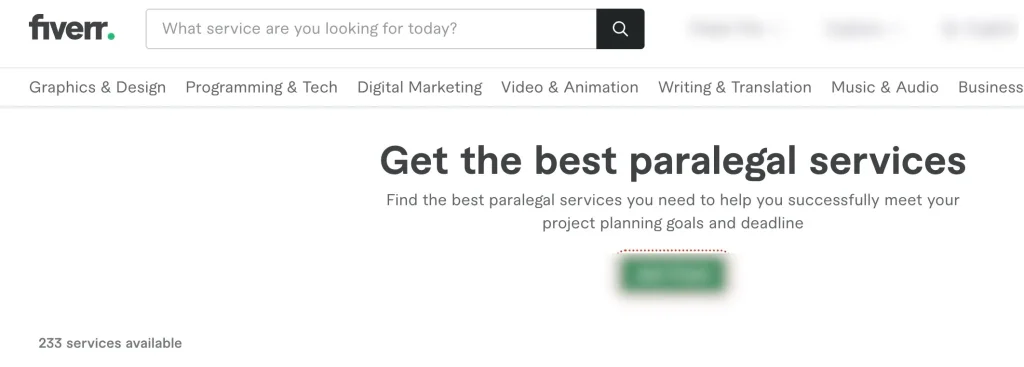To become a freelance paralegal, a solid educational foundation is essential; while many start with an associate’s degree in paralegal studies, others may enter the field with a bachelor’s degree or a paralegal certificate, which can enhance their qualifications.
While gaining 3-5 years of work experience is common for aspiring freelance paralegals, some may successfully transition to freelancing with less experience, particularly if they possess strong skills or relevant certifications.
As a freelancer, you can pick your clients and set your rates. Rates usually range from $22 to $45 per hour. Some freelance paralegals may charge higher rates depending on their expertise and the complexity of the work.
The demand for freelance paralegals is increasing, with a 12% annual growth in the U.S. until 2026.
The legal industry is changing, and freelance paralegal services are becoming more popular. As a freelance legal assistant, you’ll work on various projects across different sectors. This guide will help you start your freelance paralegal career, from understanding the role to managing your business.
Unlike traditional paralegals, freelance paralegals work independently. You’ll have the freedom to set your own schedule and choose your clients. This flexibility comes with the responsibility of finding work and marketing your skills. Many freelancers use legal software like PracticePanther to manage their business effectively.
Key Takeaways
- A solid educational foundation and relevant experience or certifications are crucial for a successful transition to freelance paralegal work.
- Hourly rates range from $22 to $45, with higher rates for specialized skills
- The demand for freelance paralegals is growing at 12% annually in the U.S.
- Freelancing offers flexibility in schedule and client selection
- Networking and marketing skills are crucial for success in freelance paralegal work

Understanding the Role of a Freelance Paralegal
Freelance paralegals work for themselves. They help law firms and lawyers with legal tasks. They do this on a contract basis, not for one employer.
Definition and Responsibilities
As a freelance paralegal, you work for yourself. You take on projects from different clients. Your job might include writing legal papers, doing deep research, and organizing case files.
You need to know legal tech well. You also have to meet the needs of each client.
Differences from Traditional Paralegals
Freelance paralegals have more freedom. They can choose their work hours and where they work. They can also set their own pay, which might be more than a regular job.
But, they have to handle their own money and benefits. This means more work for them.
Legal Industry Trends Favoring Freelance Paralegals
The legal industry is increasingly utilizing freelance paralegals not only as a cost-effective solution but also as a strategic approach to manage fluctuating workloads, rather than solely reducing traditional staff.
This change lets firms get help when they need it. They don’t have to pay for a full-time employee.
| Aspect | Freelance Paralegal | Traditional Paralegal |
| Work Schedule | Flexible, self-determined | Fixed, office hours |
| Clients | Multiple clients | Single employer |
| Income Potential | Variable, based on projects | Fixed salary |
| Benefits | Self-provided | Employer-provided |
Educational Requirements and Certifications
To become a freelance paralegal, you need a solid educational foundation. Most employers prefer paralegals with an associate degree or certificate in paralegal studies. Some even look for candidates with a bachelor’s degree in legal studies. These programs cover essential topics like legal research, document preparation, and the legal system.

Pursuing a paralegal certificate can boost your credentials. Many nationally recognized paralegal associations offer certification programs. Namely, the National Association of Legal Assistants (NALA) provides the Certified Paralegal (CP) designation. This certification can set you apart in the challenging freelance market.
Constant learning is key in the legal field. Stay updated with the latest legal trends & regulations through ongoing education. Consider specializing in specific areas of law to increase your marketability as a freelance paralegal.
| Education Level | Typical Duration | Benefits |
| Associate Degree | 2 years | Foundational knowledge, entry-level positions, and a pathway to further education. |
| Bachelor’s Degree | 4 years | Advanced knowledge, higher-level positions and improved job prospects in competitive markets. |
| Paralegal Certificate | 6-12 months | Specialized skills, quick entry into the field, and potential for immediate employment in various legal settings. |
Remember, while education is crucial, practical experience is equally important. Many successful freelance paralegals gain 3-5 years of work experience before venturing into freelancing. This experience helps build a network and develop the skills needed to thrive in the competitive freelance market.
Building Experience and Specialized Skills
To do well as a freelance paralegal, you must have a solid base of legal experience and skills. This mix will make you stand out in the legal world. It will also draw in top clients.
Gaining Practical Experience
Begin by working in law firms or legal departments for 3-7 years. This experience will teach you the details of legal work. Try different areas of law to grow your knowledge and versatility as a freelancer.
Developing Niche Expertise
Being a specialized paralegal makes you more appealing to clients. Pick a law area you like, like intellectual property or real estate. Learn more about it with specific training and certifications.
Enhancing Technical Skills
In today’s world, knowing tech is key for a freelance paralegal. Get to know legal software and research tools. Keep up with new tech in law to serve your clients better.
| Skill Area | Importance | Examples |
| Legal Research | High | Westlaw, LexisNexis |
| Document Management | High | iManage, NetDocuments |
| Case Management | Medium | Clio, MyCase |
| E-Discovery | Medium | Relativity, Everlaw |
Focus on these skills to build a strong base as a litigation paralegal or in other fields. Your tech skills and legal experience will make you very valuable to law firms and departments.
Setting Up Your Freelance Paralegal Business
Starting a freelance paralegal business needs careful planning. First, choose a legal structure. Many choose an LLC to protect their assets. Then, make a business plan with your services, target market, and money goals.
It’s important to price your legal services right. Freelance paralegals usually charge $22 to $45 an hour. Think about your experience, where you are, and your skills when setting prices. You can also charge for specific projects. Don’t forget to add in business and living costs when setting your fees.
Having a professional online presence is important to getting clients. Make a website to show off your skills and services. Use social media to network and share legal tips.
| Essential Setup Steps | Considerations |
| Choose Legal Structure | LLC for liability protection |
| Develop Business Plan | Include services, market analysis, financial projections |
| Set Pricing Strategy | Hourly ($22-$45) or project-based |
| Establish Online Presence | Professional website, social media profiles |
Buy the right tools like a computer, scanner, and phone for calls. As your business grows, you might need office space for meetings. Success in this field comes from knowing law, business, and networking well.
Marketing and Finding Clients as a Freelance Paralegal
Marketing well is crucial for a successful freelance career. A strong online presence, good networking, and using freelance platforms help attract clients. This way, you can grow your business.
Creating an Online Presence
A professional website & active social media are key. Show your expertise and services. Share legal insights to draw in clients. Think about making a marketing brochure to show off your skills.
Networking Strategies
Networking is vital for freelance paralegals. Join local associations and go to industry events. Connect with old employers, peers, and clients. Always follow up on leads to increase your chances.
- Attend legal industry events
- Join professional associations
- Connect with former colleagues and clients
- Participate in online legal forums
Leveraging Freelance Platforms
Freelance platforms are a good start for finding clients. Make profiles on sites like Upwork, Freelancer, and Fiverr. Emphasize your niche expertise and aim for specific clients. Being consistent in your marketing is key.
Marketing consistency is a key factor for success in freelance paralegal work.
Don’t forget to follow up on leads and make phone calls. Direct mail campaigns can also help. By using these strategies and offering great service, you can get a steady client base.
Managing Your Freelance Paralegal Career
Managing a freelance paralegal career needs good time management. You’ll handle many clients and projects. It’s also important to keep a good balance between work and life.
Being successful as a freelancer means keeping up with legal trends. You also need to keep improving your skills.
Building a strong reputation is key for success. Always do great work and meet deadlines. This will help you gain trust from clients. Also, join professional groups to network and learn about new things in the industry.
A freelance paralegal career is challenging but rewarding. It offers unique opportunities for personal fulfillment and business ownership.
Improving your skills is vital in the changing legal world. Keep up with trends by going to workshops and webinars. Take courses to get better at what you do and offer more services.
| Aspect | Impact on Freelance Paralegals |
| Remote Work | Increased flexibility, adaptation to digital tools |
| Productivity | Potential for increased output and revenue |
| Work Structure | Shift towards hybrid models |
| Financial Management | Need for clear invoicing and compensation agreements |
Being a freelancer is more than just legal work. You’re also running a business. This means you have to handle money, marketing, and talking to clients. See these challenges as chances to grow and succeed in your freelance paralegal career.
Conclusion
Starting a freelance paralegal career is exciting. You get to work when you want and set your own pay. You can help with research, writing documents, and getting ready for trials.
Being a freelancer has its ups and downs. It takes time to find clients and your income might not be steady at first. But, with hard work and dedication, you can grow your business.
Think about the freedom and challenges of this career. You can focus on areas you love, making you more valuable to law firms. Your work helps law firms grow, shaping the future of legal services. Your freelance paralegal career is a chance to create your own path in the changing legal world.







